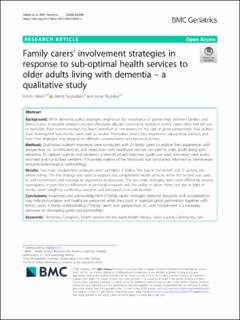| dc.contributor.author | Häikiö, Kristin | |
| dc.contributor.author | Sagbakken, Mette | |
| dc.contributor.author | Rugkåsa, Jorun | |
| dc.date.accessioned | 2021-04-08T09:22:00Z | |
| dc.date.available | 2021-04-08T09:22:00Z | |
| dc.date.created | 2020-08-18T12:03:39Z | |
| dc.date.issued | 2020 | |
| dc.identifier.citation | Häikiö, K., Sagbakken, M. & Rugkåsa, J. (2020). Family carers’ involvement strategies in response to sub-optimal health services to older adults living with dementia – a qualitative study. BMC Geriatrics, 20, 290. | en_US |
| dc.identifier.issn | 1471-2318 | |
| dc.identifier.uri | https://hdl.handle.net/11250/2736810 | |
| dc.description.abstract | Background: While dementia policy strategies emphasize the importance of partnerships between families and formal carers to provide tailored care and effectively allocate community resources, family carers often feel left out or excluded. Poor communication has been identified as one reason for the lack of good partnerships. Few studies have investigated how family carers seek to involve themselves when they experience sub-optimal services, and how their strategies may depend on different considerations and personal abilities.
Methods: Qualitative in-depth interviews were conducted with 23 family carers to explore their experiences with, perspectives on, contributions to, and interactions with healthcare services provided to older adults living with dementia. To capture nuances and variations, a semi-structured interview guide was used. Interviews were audio-recorded and transcribed verbatim. A four-step analysis of the transcripts was conducted, informed by hermeneutic and phenomenological methodology.
Results: Two main involvement strategies were identified: 1) being “the hub in the wheel” and 2) getting the wheel rolling. The first strategy was used to support and complement health services, while the second was used to add momentum and leverage to arguments or processes. The two main strategies were used differently among participants, in part due to differences in personal resources and the ability to utilize these, but also in light of family carers’ weighing conflicting concerns and perceived costs and benefits.
Conclusions: Awareness and acknowledgment of family carers’ strategies, personal resources, and considerations may help policymakers and healthcare personnel when they build or maintain good partnerships together with family carers. A better understanding of family carers’ own perspectives on carer involvement is a necessary precursor to developing good care partnerships. | en_US |
| dc.language.iso | eng | en_US |
| dc.rights | Navngivelse 4.0 Internasjonal | * |
| dc.rights.uri | http://creativecommons.org/licenses/by/4.0/deed.no | * |
| dc.title | Family carers’ involvement strategies in response to sub-optimal health services to older adults living with dementia – a qualitative study | en_US |
| dc.type | Peer reviewed | en_US |
| dc.type | Journal article | en_US |
| dc.description.version | publishedVersion | en_US |
| dc.rights.holder | © The Author(s), 2020. | en_US |
| dc.source.volume | 20 | en_US |
| dc.source.journal | BMC Geriatrics | en_US |
| dc.identifier.doi | https://doi.org/10.1186/s12877-020-01663-z | |
| dc.identifier.cristin | 1823801 | |
| dc.relation.project | Norges forskningsråd: 256431 | en_US |
| dc.source.articlenumber | 290 | en_US |
| cristin.ispublished | true | |
| cristin.fulltext | original | |
| cristin.qualitycode | 1 | |

